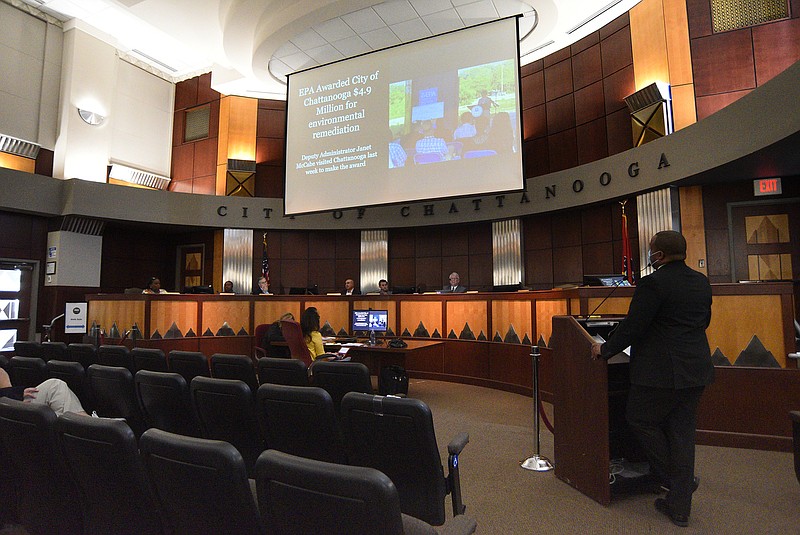With a moratorium on short-term vacation rentals not occupied by a property owner set to end in January, the Chattanooga City Council may soon consider tweaks to the city's existing rules that could include limits on their density.
Councilman Chip Henderson, of Lookout Valley, is chairman of an ad hoc committee formed to study short-term vacation rentals. In April, the council approved a temporary halt on all new applications for short-term vacation rentals not occupied by the owner, which lasts through Jan. 9.
Under existing rules, people interested in setting up a nonowner-occupied short-term rental must submit an application to the Land Development Office, according to the city's website. Officials send notification letters to all property owners within 300 feet of the property, and if the office receives a certain number of objections from nearby homeowners, the council holds a public hearing to approve or deny the permit. Owner-occupied short-term rentals have a less-stringent review process.
During those hearings, Henderson said by phone, residents frequently lamented that the increase in the number of short-term rentals was changing the character of their neighborhood. Because more and more applications were coming from out-of-town investors buying houses to convert them into short-term rentals, Henderson said, neighbors also feared the proliferation was driving up home prices.
As those concerns reached a boiling point, Henderson said, he thought it was time to step back and evaluate the effects the rentals were having on the community, including their effect on the availability of affordable housing. He was surprised by the number of nonowner-occupied rentals popping up around the city. The council opted to impose the moratorium as it evaluated existing conditions.
Henderson said he doesn't anticipate a wholesale rewrite of the existing ordinance, but it could address the saturation of short-term rentals in parts of Chattanooga. Officials have been evaluating how other cities have approached the issue. Those have ranged from limited regulations to restrictions on the types of permitted rentals and where they can go.
"We have sort of an array of different regulations to look at," Henderson said. "I think that we will at least wind up with something that addresses density in an area. In my estimation, I don't see us just completely prohibiting nonowner occupied (short-term vacation rentals), but I do see us perhaps regulating the density."
(READ MORE: Hamilton County commissioner suggests closer look at short-term rentals)
On the enforcement side, officials have also recently purchased new software called Host Compliance to identify short-term vacation rentals operating illegally. They're looking into enforcing stiffer fines for owners who violate the city's ordinance.
Chris Anderson, the senior adviser to Mayor Tim Kelly for legislative affairs, said by phone that there are more than 400 rentals operating illegally in Chattanooga, which he said is about half of the city's total.
Anderson said the city's new software sifts through websites operated by companies such as Airbnb and Vrbo to identify unregistered short-term rentals. The city is now in the process of sending letters to the more than 400 illegal properties it has identified, which officials are distributing over a nine-week period based on ZIP code. The first ones went to Lookout Valley on Tuesday.
City court citations are capped by the state of Tennessee at $50 per day, and Chattanooga officials are now looking at enforcing a per-day fine for unlicensed short-term rentals.
"A $50 fine every three months is not going to stop anyone from operating an unlicensed STVR," Anderson said. "In fact, it's cheaper to do that, so the $50 per day is a real penalty and it has real teeth."
The ad hoc committee has also discussed the notion of using the administrative hearing officer to hear those cases. State statute allows them to fine up to $500 per day.
(READ MORE: Investor home purchases adds 'pressure' to Northwest Georgia's hot real estate market)
"We are still exploring that option and have not set up the format for that yet," Anderson said, "but there's a lot of desire to do that among the council and administration."
Some owners who have been denied for a nonowner-occupied short-term rental have then returned to the city to request permission to operate an owner-occupied rental at the same property, Henderson said. The city has since made efforts to boost proof of residency requirements.
According to the city website, Chattanooga has regulated short-term rentals since 2009. At that time, the City Council passed an ordinance limiting their operation to certain residential zones, which Henderson said resulted in spot zoning in certain neighborhoods. In 2017, the panel passed another ordinance that limited their operations to a designated overlay and created a permitting process, Henderson said.
The ad hoc committee will hold its next meeting in October, Henderson said, and will review draft revisions to the ordinance at that time. He expects those could appear before the City Council before the moratorium sunsets in January.
Contact David Floyd at dfloyd@timesfreepress.com or at 423-757-6249. Follow him on Twitter @flavid_doyd.
